
The Tortricidae are a family of moths, commonly known as tortrix moths or leafroller moths, in the order Lepidoptera. This large family has over 11,000 species described, and is the sole member of the superfamily Tortricoidea, although the genus Heliocosma is sometimes placed within this superfamily. Many of these are economically important pests. Olethreutidae is a junior synonym. The typical resting posture is with the wings folded back, producing a rather rounded profile.

Ptycholoma lecheana, the Leche's twist moth, is a moth of the family Tortricidae. It is found in Europe, China, Korea, Japan, Russia and Asia Minor.

Eupoecilia ambiguella, the vine moth, is a moth of the family Tortricidae. It is found in Europe, China, India, Japan, Korea, Mongolia and the Russian Far East.
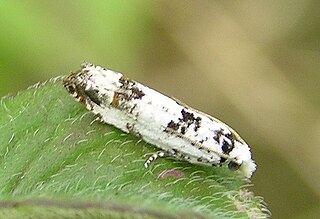
Eucosma campoliliana is a moth of the family Tortricidae. It is found in Europe, China, Japan and Russia.

Spilonota ocellana, the bud moth, is a moth of the family Tortricidae. It is found in the Palearctic realm, from North Africa and Europe to Iran, eastern Russia, China, Korea, and Japan. It is also present on Madeira and in North America.

The Zeiraphera griseana, the larch tortrix, is a moth of the family Tortricidae.

Adoxophyes is a genus of moths of the tribe Archipini.
Leguminivora is a genus of moths belonging to the subfamily Olethreutinae of the family Tortricidae.
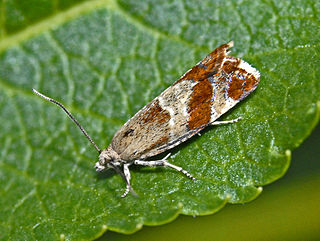
Epinotia cruciana, the willow tortrix, is a moth of the family Tortricidae.

Gravitarmata margarotana, the pine cone tortrix or pine twig moth, is a moth of the family Tortricidae. In Europe, it is found from England to Austria and Poland, east to the Baltic region to Russia, China, Korea and Japan.
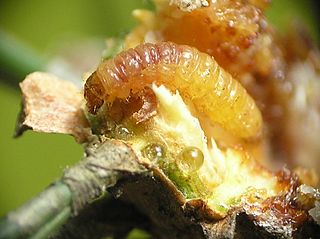
Retinia resinella, the pine resin-gall moth, is a moth of the family Tortricidae.

Epinotia tenerana, the nut bud moth or alder tortricid, is a moth of the family Tortricidae.

Rhyacionia duplana, the summer shoot moth or Elgin shoot moth when referring to subspecies logaea, is a moth of the family Tortricidae. It is found from northern and central Europe to eastern Russia, China and Japan. It has also been reported from Korea, but it has not been found in recent studies.

Rhyacionia pinivorana, the spotted shoot moth, is a moth of the family Tortricidae. It is found from northern and central Europe to eastern Russia, China, Korea and Japan.

Aethes triangulana is a moth of the family Tortricidae. It was described by Treitschke in 1835. It is found from most of Europe to Central Asia, the Amur region, China and Japan.
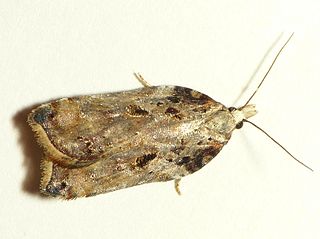
Acleris cristana, the rufous-margined button moth, is a moth of the family Tortricidae and is found from Europe through the Caucasus and Ussuri to Japan.

Grapholita molesta, the oriental fruit moth or peach moth, is a moth of the family Tortricidae. It is native to China, but was introduced to Japan and North America and is now also found throughout of Europe, Asia and South America and in Hawaii, Morocco, Mauritius, South Africa, Australia and New Zealand

Fibuloides aestuosa, the greenish chestnut moth, is a moth of the family Tortricidae. It is known from China, Korea, Japan, northern India and Bengal.
Mictocommosis nigromaculata is a species of moth of the family Tortricidae. It is found in Japan, as well as Vietnam.
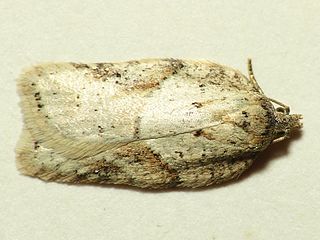
Acleris logiana, the black-headed birch leaffolder moth or grey birch button, is a moth of the family Tortricidae. It was described by Carl Alexander Clerck in 1759. It is found in most of Europe, except Ireland, Portugal, most of the Balkan Peninsula and Ukraine. It is also found in North America, the Russian Far East, Korea and Japan.

















